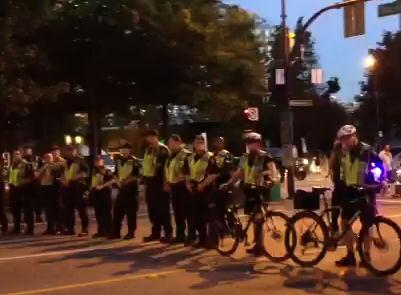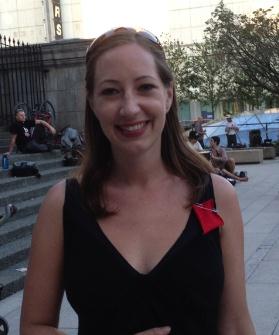
Vancouver police officers outnumbered protesters at the July 11 casseroles march. Credit: Natasha Barsotti photo
A heavy police presence on foot, on bicycles, in vans and on motorcycles prevented a small contingent of casseroles protesters, banging on pots and other metal objects, from taking their march onto the Burrard Bridge on July 11.
Around 9:30pm, about 50 Vancouver Police Department (VPD) officers lined the intersection at Burrard at Pacific, while the following message was played at two-minute intervals:
“This is the Vancouver Police Department. We respect your constitutional right to protest. To the individuals who are obstructing the roadway, under the authority of the Criminal Code of Canada governing blocking a highway and the offence of mischief, we are ordering you to clear the roadway and allow the unobstructed flow of traffic, or you will be subject to arrest. Please follow the directions of the officers who will assist those who wish to leave in a peaceful manner, and do not return this area.”
The scene was in stark contrast to the earlier street-party-like atmosphere on the Robson St side of the Vancouver Art Gallery (VAG), where about 35 to 40 casserole participants gathered, played music, danced and distributed information flyers about their protest to passersby under the watch of a handful of police on foot and on bicycles.
When a smaller contingent of protesters left the VAG to march down several downtown streets toward the Burrard St bridge at 9pm, about 20 officers, and eventually two police vans, followed.
At least one officer filmed the protesters while a line of police blocked their entry to the bridge.
The casseroles protests began in solidarity with Quebec students facing first a steep tuition increase and now a law that stringently regulates demonstrations of more than 50 people. The protests have spread across various North American centres.
“It’s become about your right to speak; it’s become about your right to peacefully assemble, peacefully express yourself as is guaranteed in the Canadian Charter of Rights and Freedoms,” participant Mathew Kagis told the gathering at the VAG.
“I’d like to wave at the officers filming me over there,” Kagis added.
Police officers present declined to be interviewed about the protest. Xtra was told there were no police spokespeople available for comment on the road and was referred to the VPD’s department of public affairs.
VPD media spokesperson Lindsey Houghton told Xtra July 12 that the police presence near the bridge was to prevent the protesters from taking over the bridge and blocking traffic.
“They were given five minutes to say their piece and get off the street, and they did, and they returned to the art gallery and everyone went home,” Houghton summarizes.
Asked why the VPD found it necessary to establish the level of presence it did, Houghton says there was “a level of violence that most people would find unacceptable” in the first two protests, noting there were threats to police officers and “even violence to police officers.”
Houghton says the protesters’ actions will create a reaction by the police. “We have to have enough police officers to ensure safety of not only the public and the protesters but police officers ourselves.” He says there’s evidence of protesters’ violent behaviour “on many videos that are online.
“But we still have to take significant steps to ensure their right to protest and facilitate that,” he adds.
Sasha Wiley-Shaw, an adult education teacher who was arrested and strip-searched at a June 27 casseroles protest, calls that experience “beyond shocking.”
She says she was arrested for demonstrating with others on a crosswalk outside the Main St police station in support of two people who were detained at the art gallery.
“[The police] alleged it was for spitting on a vehicle, which they said was some kind of vandalism or property damage,” she says. “I didn’t spit on a vehicle because it would look bad, because I’m not a spitter, because it’s just not in my character. But it happened near me, and so that was their excuse to come at me,” she says.
Wiley-Shaw says she was taken inside the jail, where, she alleges, police were “very violent with me.” She says she’s still recovering from injuries she sustained that day.
“We felt like we were seeing some testing of tactics,” Wiley-Shaw says, alleging that officers were initially aggressive toward the women protesting, then arrested anyone who responded in their defence. She says that when fellow demonstrators tried to help her find out why she was being arrested, they were also arrested.
“I’ve always thought of myself as a very careful protester. I’m really passionate about my causes, but I’m aware of my position as a teacher,” Wiley-Shaw says.
“We would deal with anyone who commits a criminal act, or is seen to be committing a criminal act — man or woman, it doesn’t matter to us,” Houghton says when asked if there was a gendered discrepancy in the way police were treating people. “Regarding her actions and her claims of injuries, there is an ongoing investigation into her actions, so we can’t speak to the evidence.
“My understanding of that evidence, including how she received her injuries, is actually quite different than what she has been claiming,” Houghton continues. “And from listening to her and other people in the media, the story seems to change on an almost daily basis, regarding her injuries.”
Houghton says the VPD videotaped the entire incident from many different angles. “That will be used in any investigation, and we would encourage her, like we would encourage anyone, to file a complaint if she has concerns,” he adds.
“I am going forward with legal action,” Wiley-Shaw asserts. “I haven’t filed claim at this point, but it’s my intention to, and I have counsel.”
BC Civil Liberties Association (BCCLA) policy director Micheal Vonn says the organization has been present from time to time at the casseroles and is at an information-gathering stage.
“As a pattern gets established, especially if we see a consistent number of demonstrators, it raises the question regarding what [police] might be doing with these very intensive deployments,” she says. “But it may be too early on to have a good sense of that.
“We would be very receptive to hearing people’s experience as demonstrators if they believe their rights have been violated,” she adds.
Wiley-Shaw continues to attend the casseroles despite her arrest. “I really like the dance-party vibe of it,” she says. “The idea of celebrating what we love about democracy and standing up for those rights is kind of the vibe of this.”
She says she’s been demonstrating since childhood, recalling an early Gulf War rally she and her friends attended. “I’ve never seen events as over-policed as the casseroles around the end of June.”
Globally, she notes, there’s over-policing to try and shut down anyone who’s protesting things connected to austerity.
“That’s what’s at the heart of [these casserole protests], is Quebec’s austerity budget, and that’s where the tuition hikes come in.”
The issue of access to education is important to her, Wiley-Shaw says, adding it’s tied into “all our other rights. If you’re going to be able to stand up for and exercise any of your rights, that takes a certain level of education.
“If policing tactics are coming before the Charter of Rights and Freedoms,” she adds, “then I think we have to ask questions about our so-called democratic Canada.”
Wiley-Shaw says the VPD sent an officer to Montreal for training.
Houghton confirms that one officer went to Montreal to see how police “were working with the protests there.”
“This is a very normal thing,” he says. “Every police agency around the world, including the VPD, sends people everywhere to see how police departments do things.”


 Why you can trust Xtra
Why you can trust Xtra


